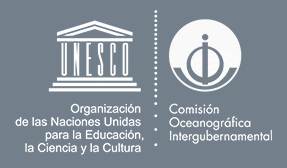Displaying 893 results.

Status report of IOC Regional Activities
The IOC’s Regional Subsidiary Bodies play an important role in the implementation of the Commission’s programmes in the regions. These efforts are complemented by other IOC decentralized offices, and regional networks established by the IOC’s global programmes. The report provides an overview of the status of IOC Regional Activities.
Author: IOC
Year: 2011
Keywords: coordination mechanism
 5
5


 Report issue
Report issue
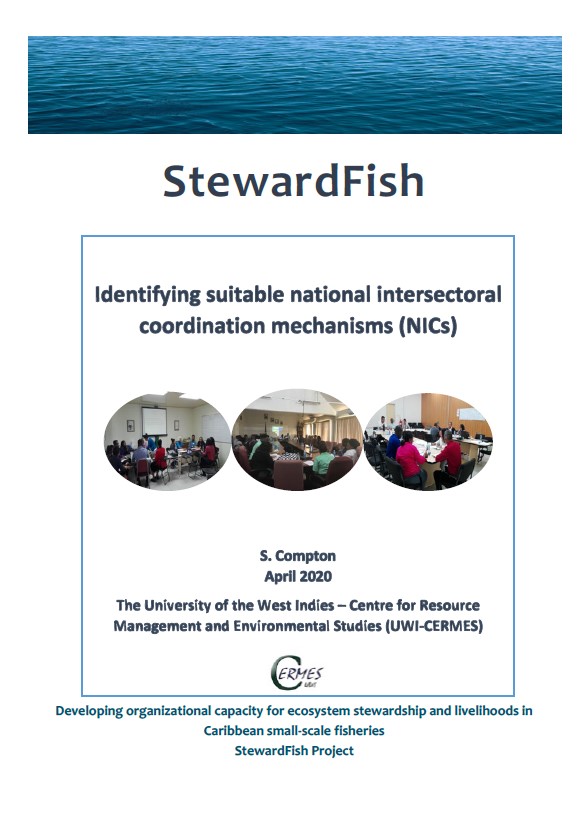
StewardFish – Identifying suitable national intersectoral coordination mechanisms (NICs)
The Strategic Action Programme for the Sustainable Management of the Shared Living Marine Resources of the Caribbean and North Brazil Shelf Large Marine Ecosystem (CLME+ SAP) proposes to achieve a regionally adopted long-term vision for a healthy marine environment that can sustain and provide benefits for human well-being and livelihoods. Through the CLME+ SAP, intersectoral governance arrangements such as National Intersectoral Coordination Mechanisms (NICs) have been identified as critical for ecosystem-based management (EBM) and ecosystem approach to fisheries. The StewardFish project aims to empower fisherfolk throughout fisheries value chains to engage in resource management, decision-making processes and sustainable livelihoods with strengthened institutional support at all levels. StewardFish is being implemented within seven Caribbean Regional Fisheries Mechanism (CFRM) Member States: Antigua and Barbuda, Barbados, Belize, Guyana, Jamaica, Saint Lucia and St. Vincent and the Grenadines. NICs within this context of StewardFish can be thesupporting mechanisms for fisherfolk engagement and good governance. Component 4 of the project is focused on good governance and learning for adaptation institutionalized among fisherfolk organisations. Activities under this component call for the identification of suitable NICs for the implementation of StewardFish. A multi-method approach utilizing primary and secondary sources was used to help in the identification of NICs in the seven countries. Information on NICs is still limited. Nevertheless, the most suitable arrangements for StewardFish was selected based on how much information was made available at time of this report. Although NICs or the closest similar arrangements have been identified for each country it is further recommended that, where and when possible, other governance arrangements, especially in the coastal and ocean marine sectors, be engaged.
Author: CERMES
Year: 2020
Keywords: StewardFish, NICs, EBM, EAF EAF, EBM, Ecosystem Based Management, governance
 3
3


 Report issue
Report issue
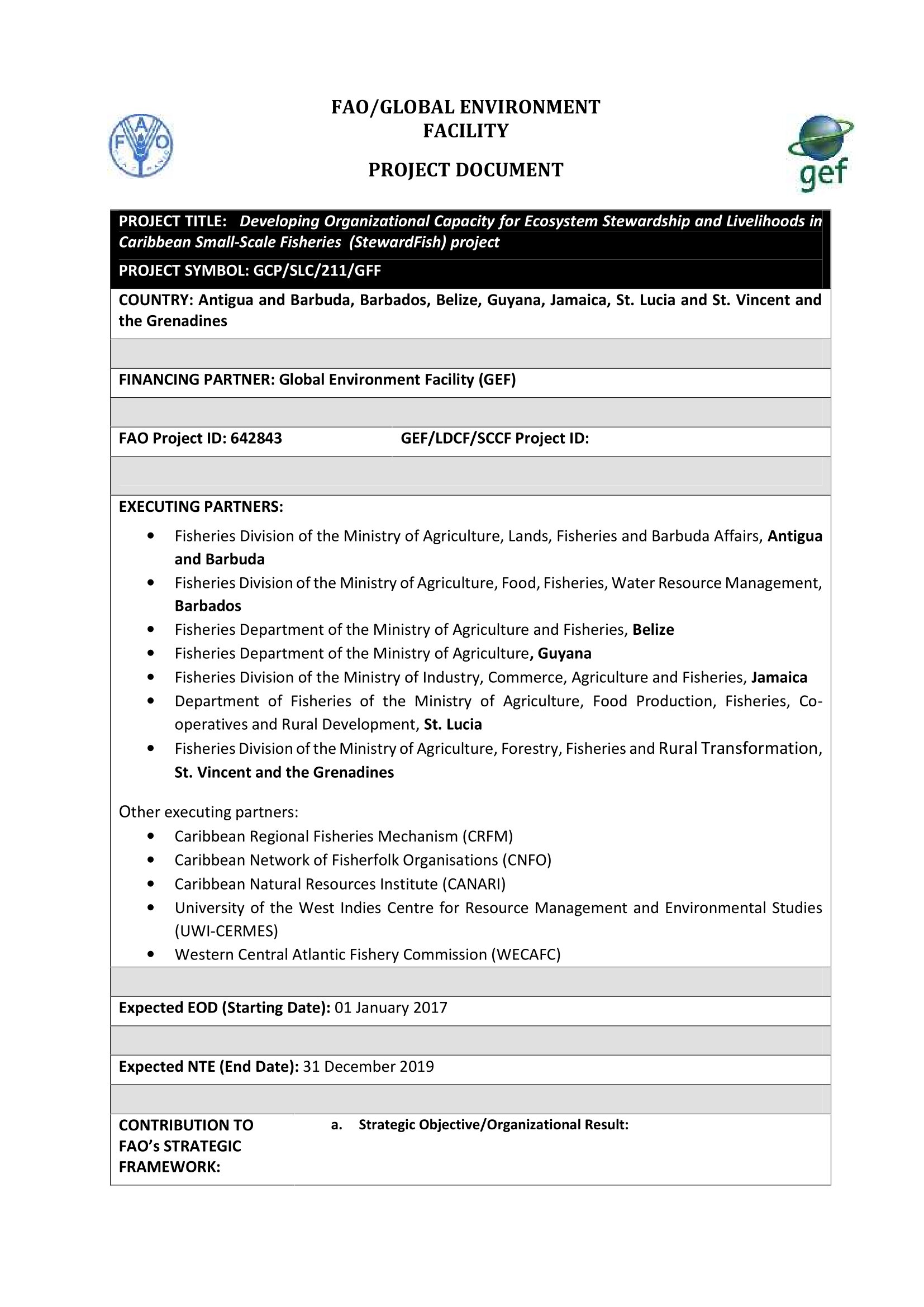
Stewardfish Caribbean Project Document
The seven countries participating in the Developing Organizational Capacity for Ecosystem Stewardship and Livelihoods in Caribbean Small-Scale Fisheries(StewardFish) project – Antigua and Barbuda, Barbados, Belize, Guyana, Jamaica, Saint Lucia, St. Vincent and the Grenadines have a high dependence on fisheries resources, whether for income generation, nutrition and food security. Fisheries degradation and over-exploitation are causes of major concern within the region. Due to the high dependence in the Caribbean on marine resources, the high vulnerability of fisherfolk, the concentration of fisheries infrastructure in the coastal zone, plus increasing intensity of extreme-weather events, effective adaptation measures for the fisheries sector are critical for sustainable livelihoods, improved food security and conservation of marine resources.
Author: FAO
Year:
Keywords: LME, Large Marine Ecosystems
 5
5


 Report issue
Report issue
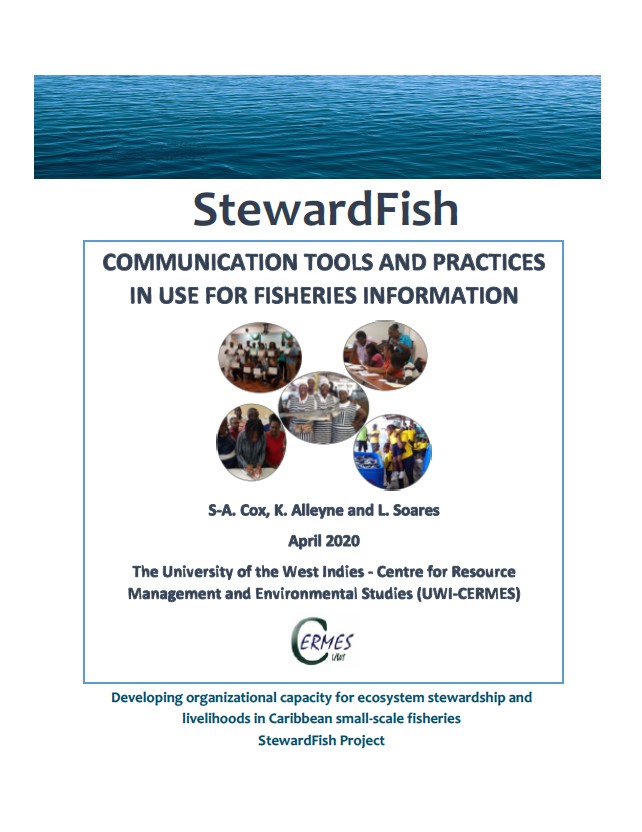
StewardFish Communication tools and practices in use for fisheries information in the Caribbean
The provision of timely and salient fisheries information tailored for fisherfolk use is critical in promoting
ecosystem stewardship for fisheries sustainability. Fisheries information in the Caribbean is communicated in several ways using different communication tools and platforms. However, the
information is generally not packaged or tailored for fisherfolk, the intended end users. This may limit their awareness of new concepts, guidelines and policies that have implications for their day-to-day
operations, and exclude them from making valuable input into fisheries policies, plans and practices. This report provides a summary of an investigation of the communication tools and practices in use for
fisheries information in the 17 CRFM member states. This exercise provided valuable insight to the tools
used by end users and their practices for accessing information. We found that WhatsApp and word of
mouth (used daily in many cases) were the preferred means of communication for fisheries information. This exercise also revealed that potential tools such as Email and Facebook can be explored. The extent to which fisheries information providers in the region are using WhatsApp to communicate with fisherfolk needs to be determined, as well as their capacity to use the platform effectively. We recommend that the CRFM leads an assessment of the capacities of fisheries information providers/producers in the Caribbean to effectively employ the communication tools used by fisherfolk to receive fisheries information. We anticipate that this assessment will help to inform interventions at regional and national levels to improve communication and promote ecosystem stewardship for fisheries sustainability.
Author: CERMES
Year: 2020
Keywords: StewardFish; Fisheries; Communication Communication Strategy, fisheries
 3
3


 Report issue
Report issue
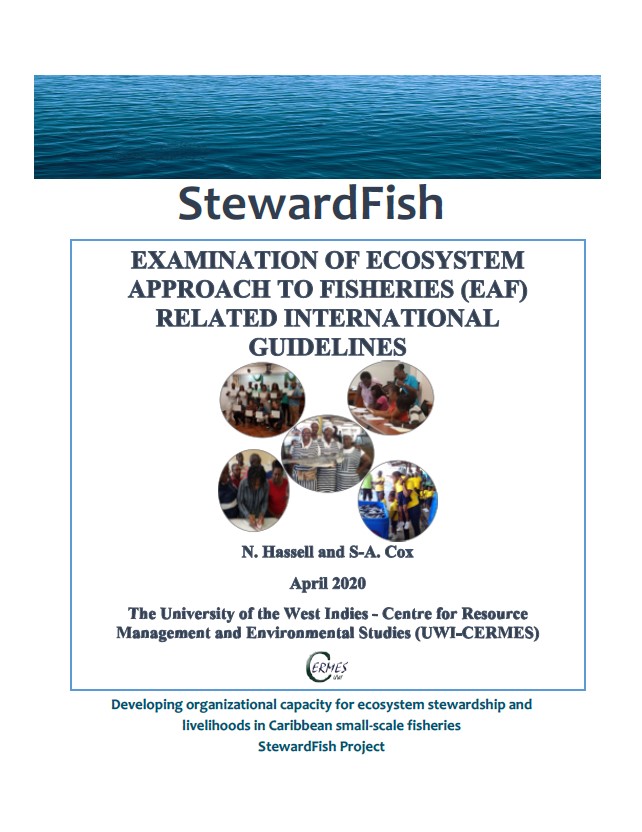
StewardFish Examination of Ecosystem Approach to Fisheries (EAF) related International Guidelines
Ecosystem approach to fisheries (EAF) is advocated as a means of natural resource management
focused on the conservation and sustainable use of the whole ecosystem. The approach is not new; its key principles have their roots in earlier natural resource management instruments, as well as indigenous management practices and customary tenure developed millennia ago. There are now a number of international agreements and instruments which describe what EAF entails, its guiding principles and how it is implemented. Despite this attention, countries have been challenged to put in place measures required to give effect to the principles at the national and local level. In the Caribbean, there is a supportive political foundation for EAF, however, most countries are making slow incremental progress. To support operationalization of EAF principles in the Caribbean the StewardFish project recommends the development of both regional and national-level practical EAF Codes of Conduct by and for persons in the fishing industry. Following a methodology previously used in Barbados to develop a local fisheries code of conduct, we outline an iterative social learning process of development for these codes, which emphasizes industry engagement, formal endorsement, implementation and participatory monitoring and evaluation.
Author: CERMES
Year: 2020
Keywords: StewardFish; EAF EAF, fisheries
 4
4


 Report issue
Report issue
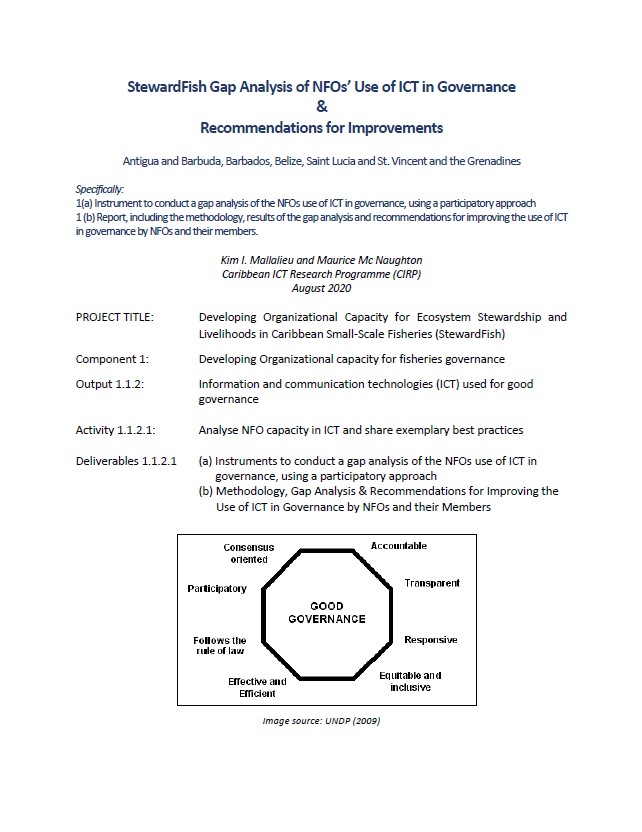
StewardFish Gap Analysis of National Fishers Organizations(NFOs) Use of ICT in Governance & Recommendations for Improvements
This report analyzes current gaps in the use of ICT for governance by national fisherfolk organizations (NFOs) in Antigua and Barbuda, Barbados, Belize, Saint Lucia and St. Vincent and the Grenadines. The findings of the gap analysis direct recommendations for remediation strategies and actions. These recommendations recognize the critical role of the Caribbean Network of Fisherfolk Organizations (CNFO) in strengthening the proposition of, and provisions for ICT for NFO governance.
The gap analysis was informed by the constitutions and by-laws of NFOs and the CNFO as the authoritative references for essential governance functions and roles. These were examined in relation to potential benefits of ICTs by role and function. Assessments were conducted on ICT hardware, software, services and digital literacy necessary for context-appropriate ICTs to work for good governance. The gap analysis also drew heavily on rich consultations and other forms of interaction with multiple stakeholders over several months straddling 2019 and 2020. Key informants were drawn from amongst NFO leaders, board members and associates as well as fisheries authorities and the CNFO. Consultations were also held with personnel from The University of the West Indies’ Centre for Resource Management and Environmental Studies (CERMES) and Caribbean Natural Resources Institute (CANARI) as well as with the regional coordinator for the StewardFish Project. Insights were gained into FFO governance arrangements, operations and operational priorities, ICT facilities, current use of ICT for governance, and prevailing challenges to the discharge of governance functions and to the use of ICT in support of governance. Triangulated insights were gained into NFO capacity to use ICT for good governance. Best practices in the use of ICT for good governance were identified.
The report finds that to varying degrees across all countries, a debilitating barrier is the lack of a framework for the systematic embedding of ICT into routine operations. Such a framework would include but not be limited to: basic ICT policy and strategy; documented procedures, guidelines, guidance notes, checklists and templates; key data and its requirements specification; digital literacy proficiency standards, learning resources, capacity development provisions and code of conduct; and underlying information and communications strategies and plans. The report finds that the absence of such a framework as well as weaknesses in underlying governance processes and organizational arrangements percolate up to weaknesses in the application of ICT for governance. Among other things, this is characterized by a weak information management chain.
All FFOs under consideration have been found to suffer from resource constraints, in some cases crippling. This amplifies the need for operational and resource efficiencies derived from streamlined processes, structured documentation, standardization, sharing of resources and context-appropriate competence. The report recommends an overarching strategy for cloud based infrastructure, centralized information assets and standardization as a context-sensitive response strategy. A minimum configuration of ICT hardware, software and services is recommended for NFOS and for the CNFO.
The report recommends that the CNFO play a central role as resource repository, advocate and mentor; and that, through its Leadership Institute, it administers an ICT for governance course for NFO board members in its member countries. Such a course would be delivered through mixed-mode, comprising asynchronous mobile learning and synchronous reinforcement, the latter face to face where national (COVID-19) regulations allow. Course delivery would engage the facilitation services of in-country trainers to support local learners. The report further recommends that within a basic ICT for governance framework, which it deems to be a strategic imperative, the proposed course is adopted as an on-boarding requirement for all NFO board members.
Author: UWI-CIRP
Year: 2020
Keywords: StewardFish, Capacity Building; ICT Training and Capacity Building, fisheries, governance
 4
4


 Report issue
Report issue
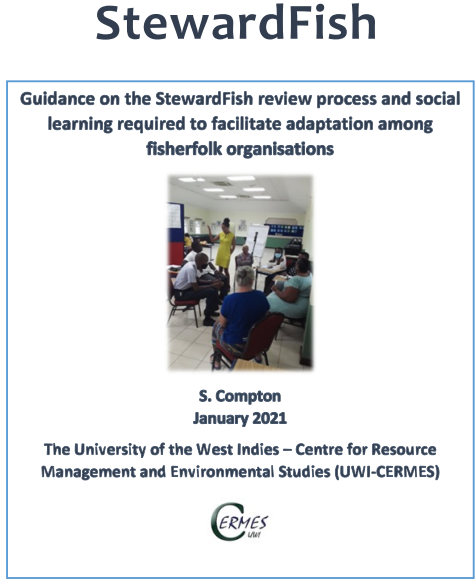
Stewardfish Guidance on Stewardfish Review Process and Social Learning Required to Facilitate Adaptation Among Fisherfolk Organisations
Under the CLME+ SAP, the Global Environment Facility (GEF) is funding the Developing Organisational Capacity for Ecosystem Stewardship and Livelihoods in Caribbean Small-Scale Fisheries (StewardFish) project, to be implemented by the United Nations Food and Agriculture Organization (FAO). The Centre for Resource Management and Environmental Studies (CERMES) is working in collaboration with other regional implementing partners1 to execute the various components of the project in seven countries within the CLME+ region: Antigua and Barbuda, Barbados, Belize, Guyana, Jamaica, Saint Lucia and St. Vincent and the Grenadines. Component 4 of the project focuses on project management, monitoring and evaluation, and communication. Outcome 4.1 – Good governance and learning for adaptation institutionalized among fisherfolk organisations, has several activities specific to learning and understanding processes and mechanisms in place for strengthening institutional support and empowering fisherfolk across the region.
This report specifically focuses on activity 4.1.1.1 (b) – Provide guidance on the review process and social learning required to facilitate adaptation. The report was delayed due to COVID-19 constraints in the countries, which placed project activities behind schedule. The on-going impacts of the pandemic on communication and interaction feature prominently in several sections.
Author: Compton, S
Year: –2021
Keywords: Stewardfish, Governance, Fisheries
 4
4


 Report issue
Report issue
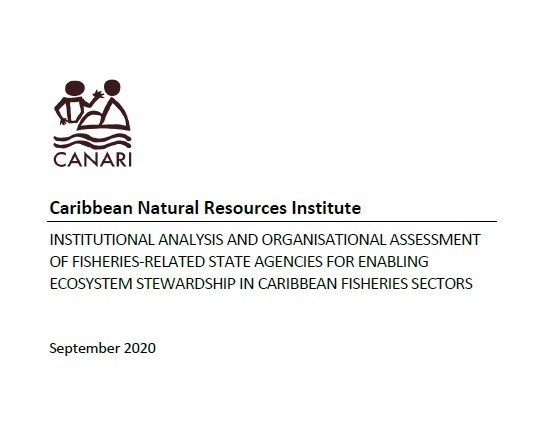
StewardFish Institutional and Organizational Assessment of fisheries-related state agencies for enabling ecosystems stewardship in the Caribbean Fisheries Sectors
StewardFish recognizes that there are several challenges that hinder the engagement of fisherfolk and their organizations in the sustainable use and management of fisheries in the region including fisheries-related state agencies not having adequate capacity to support fisherfolk and their organizations with ecosystem stewardship initiatives. Because state agencies, including fisheries authorities, vary widely in their support of fisherfolk organizations for different reasons, some within their control and others beyond, a situation specific analysis is required.
In support of this, CANARI conducted an Institutional Analysis and Organizational Assessment in each of the project countries to contribute to Outcome 1.2 “Fisheries-related state agencies have capacity to support fishing industry stewardship” and Output 1.2.1 “state agency implementation gaps are assessed regarding support for fisherfolk organizations and their role in stewardship” of the project.
The aim of the analysis was to identify current strengths, as well as opportunities for improvement in each project country’s fisheries-related state agencies, in order to improve their capacity to support ecosystem stewardship by fisherfolk and their organizations. The analysis included:
• Designing an institutional analysis tool adapted from the Adaptation: Rapid Institutional Assessment (ARIA) methodology, including an organizational assessment survey targeted at the fisheries authorities
• Conducting desk studies, surveys, virtual and in-country interviews and focus groups with fisherfolk, fisheries authorities and other key state agencies in the project countries
• Facilitating national workshops3 to present, validate, refine and receive input on the preliminary findings and identify priorities for improvement, in each project country
• Producing country reports of findings, including recommended priorities for improvement
This report provides a brief summary of the common findings and recommendations from the institutional analyses and organisational assessments that were conducted in the seven target countries between December to September 2020.
Author: CANARI
Year: 2020
Keywords: StewardFish, Capacity Building fisheries, governance
 4
4


 Report issue
Report issue
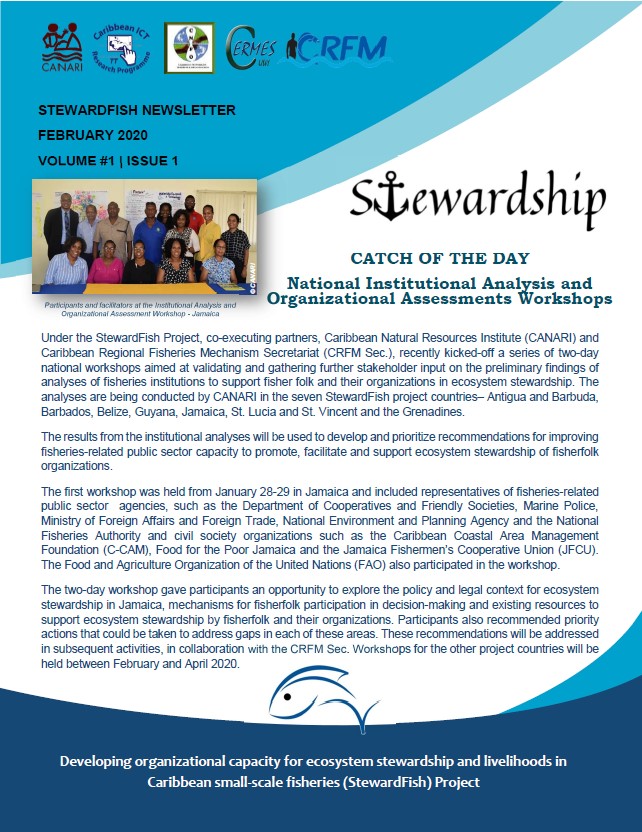
StewardFish Newsletter (StewardShip) Volume 1 Issue 1
“Stewardship” is a joint publication of the regional project partners for StewardFish. In this issue, we highlight our on-going National Institutional Analysis and Organizational Assessments Workshops as well as our project achievements for 2019. We also introduce you to a “Reel” Fisher from Jamaica.
Author: CANARI; CERMES; CIRP; CNFO; and CRFM
Year: 2020
Keywords: StewardFish fisheries
 3
3


 Report issue
Report issue
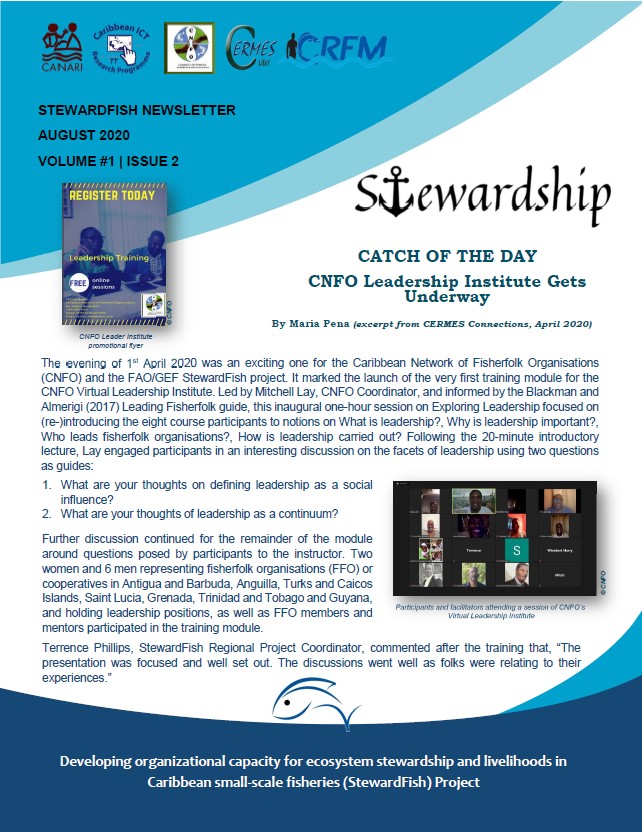
StewardFish Newsletter (StewardShip) Volume 1 Issue 2
“Stewardship” is a joint publication of the regional project partners for StewardFish. In this issue, we highlight the launch of CNFO’s Leadership Institute, introduce you to Devon Stephen- a local fisher from Saint Lucia and update you on the implementation of StewardFish in a Covid-19 environment. Also of interest, Belize announces their Fisher of the year and the Regional Code of Conduct for Caribbean Fishers has been finalized. Finally look out for our tips to help fishers stay safe during the pandemic.
Author: CANARI; CERMES; CIRP; CNFO; and CRFM
Year: 2020
Keywords: StewardFish fisheries
 3
3


 Report issue
Report issue










